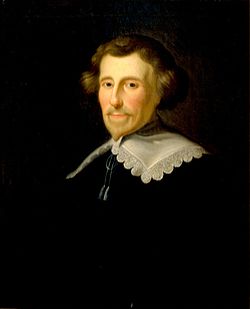Pieter Corneliszoon Hooft: Difference between revisions
→External links: ce commons / order cats |
m duplicate categorization; already in subcat(s). using AWB |
||
| Line 6: | Line 6: | ||
==Life== |
==Life== |
||
[[File:Werkkamer PCHooft.jpg|thumbnail|Working table of |
[[File:Werkkamer PCHooft.jpg|thumbnail|Working table of Pieter Corneliszoon Hooft]] |
||
Pieter Corneliszoon Hooft, often abbreviated to ''P.C. Hooft'', was born in Amsterdam as the son of the then mayor, [[Cornelis Hooft]]. Hooft was also the uncle of [[Cornelis de Graeff|Cornelis]] and [[Andries de Graeff]]. |
Pieter Corneliszoon Hooft, often abbreviated to ''P.C. Hooft'', was born in Amsterdam as the son of the then mayor, [[Cornelis Hooft]]. Hooft was also the uncle of [[Cornelis de Graeff|Cornelis]] and [[Andries de Graeff]]. |
||
| Line 66: | Line 66: | ||
[[Category:Dutch historians]] |
[[Category:Dutch historians]] |
||
[[Category:Dutch male poets]] |
[[Category:Dutch male poets]] |
||
[[Category:Dutch male writers]] |
|||
[[Category:Knights of the Order of Saint Michael]] |
[[Category:Knights of the Order of Saint Michael]] |
||
[[Category:Male dramatists and playwrights]] |
[[Category:Male dramatists and playwrights]] |
||
Revision as of 16:04, 5 June 2017
This article needs additional citations for verification. (February 2014) |

Pieter Corneliszoon Hooft (16 March 1581 in Amsterdam – 21 May 1647 in The Hague) - Knight in the Order of Saint Michael - was a Dutch historian, poet and playwright from the period known as the Dutch Golden Age.
Life

Pieter Corneliszoon Hooft, often abbreviated to P.C. Hooft, was born in Amsterdam as the son of the then mayor, Cornelis Hooft. Hooft was also the uncle of Cornelis and Andries de Graeff.
In 1598, his father sent him to France and Italy in order to get prepared for a career as merchant. However, Pieter Corneliszoon Hooft was more interested in art. In particular, he was deeply impressed by the Italian renaissance.[1]
In 1609, he was appointed bailiff of Muiden and the Gooiland. He founded the Muiderkring, a literary society located at his home, the Muiderslot, the castle of Muiden, in which he got to live due to his appointment as sheriff of Muiden. Among the members were the poets and playwrights Constantijn Huygens, Maria Tesselschade, G.A. Bredero and Joost van den Vondel, as well as the Portuguese singer Francisca Duarte. Hooft, Bredero, and Vondel were also founders of the First Nederduytsche Academy.
Work
Hooft was a prolific writer of plays, poems and letters, but he concentrated from 1618 onwards on writing his history of the Netherlands (Nederduytsche Historiën), inspired by Roman historian Tacitus. His focus was primarily on the Eighty Years' War between the Netherlands and Spain. Though he tried in this work to give a report of the events which was as impartial as possible, he did not really succeed in doing so.
As a poet, he was influenced by his Renaissance contemporaries in France and Italy.
Plays

- Geeraerdt van Velsen ( 1613)
- Achilles en Polyxena (1614)
- Theseus en Ariane (1614)
- Granida (1615)
- Warenar (1616)
- Baeto, oft oorsprong der Holanderen (1626)
Poems
- Emblemata amatoria: afbeeldingen van minne (1611)
History
- Nederduytsche Historiën (1642-1656)
Present-day legacy
In present-day Amsterdam Pieter Corneliszoon Hooft gives his name to P.C. Hooftstraat, the city's main destination for expensive designer clothes shopping. The south-western end of P. C. Hooftstraat runs into the city's main park, the Vondelpark, named for his friend Joost van den Vondel (see Life above). In many other Dutch cities, there are other streets named after Hooft, many of them also called P. C. Hooftstraat or Pieter C. Hooftstraat.
In 1947, 300 years after P.C. Hooft died, a literary prize in his name was instituted by the Dutch government. An independent foundation annually awards the prize. Initially it was awarded for specific works, but in recent years it is awarded based on the entire collection of a writer.
He is also erroneously mentioned as "Denmark's most famous poet" on episode three of the television program Metalocalypse.
Gallery
-
Sculpture of P.C. Hooft in the castle Muiderslot
-
Sculptor Frits Sieger with bust of P.C. Hooft. Amsterdam; 22 March 1947
References
- ^ Dautzenberg. J. Nederlandse literatuur, geschiedenis, bloemlezing en theorie tot 1916. Den Bosch: Malmberg, p. 83-88
External links
- Works of Hooft in the Laurens Janszoon Coster project (Dutch)
- P.C. Hooft (1581-1647) - pictures of P.C. Hooft
- Works by Pieter Corneliszoon Hooft at Project Gutenberg
- Works by or about Pieter Corneliszoon Hooft at the Internet Archive
- Works by Pieter Corneliszoon Hooft at LibriVox (public domain audiobooks)



